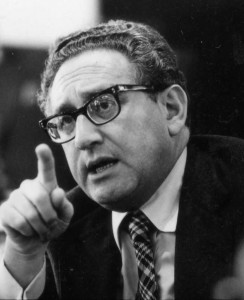Is This the Best You Can Do?
I first heard this story during a speech given by G. Gordon Liddy in 1979 when he spoke at Florida Atlantic University. I can’t vouch for its accuracy, but in the words of Jimmy Buffett, “don’t care if it’s true, ‘cause I love it so well.”
When Henry Kissinger became President Nixon’s National Security Adviser in 1969, he brought a reputation as a demanding taskmaster. So, when a staffer was given an assignment to write a position paper for his new boss, he understandably put in extra hours and took great pains to produce top-notch work. A day after he had turned it in, Kissinger called him into his office and asked him, “Is this the best you can do?”
The staffer promised he could improve it, and went back to his desk. He cancelled his other appointments, called his wife to tell her he would be home very late, and worked feverishly on the report: fine-tuning it, adding information, clarifying where necessary, etc. At the end of the week, he turned it in. On Monday morning, Kissinger passed by and contemptuously dropped the report on his desk. In a loud voice, he again asked, “Is this the best you can do?”
Stunned and not a little frustrated, the staffer vowed to do even better, and redoubled his efforts from the previous week, putting even longer hours and finding even better ways to express and support his position. Two days later, convinced that it was as close to perfect as he could get it, he turned it in again. The next day, Kissinger again asked, “Is this really the best you can do?” The young man had had enough, so he looked at Kissinger squarely and said, “Yes, that is the best I can do.”
Kissinger replied, “Good. Now I will read it.”
I told that story today in a Precision Questioning and Answering class I taught in Beijing (where the name Kissinger is well known) to drive home the point that you owe it to yourself and to your audience/client/boss to give them absolutely the best you can do when you bring a proposal or make a presentation. When your personal credibility is at stake, your first draft is never the best you can do. You can always do better, and should always do better.
In the PQ&A class, we teach a specialized process for ensuring that you ask the right questions of yourself to challenge your own thinking, to find the weak spots, additional data needed, etc. before someone else does it to you. But you don’t need a specialized process to know that you should put yourself into the mind of the person whose approval you need, so that you can anticipate what they might need to know, how their perception might differ from yours. Look at your idea, not from the perspective of a proud owner, but from that of a skeptical buyer.
Will it take a little extra time to do the best you can do? Of course it will. But in my experience, I’ve seen people spend far more time fiddling with the animation or fonts of their slide presentations than they do in anticipating what their toughest questioners might ask, and then preparing their answers—or, better yet—answering the questions before they even come up.
If you want to be absolutely sure that you have the best possible chance of success when presenting your proposals, put up a picture of Kissinger where you can see it, and pretend he’s asking you,
Is this the best you can do?





Superb article and great reminder – some you personally taught me Jack. A great question to ask before any presentation!!